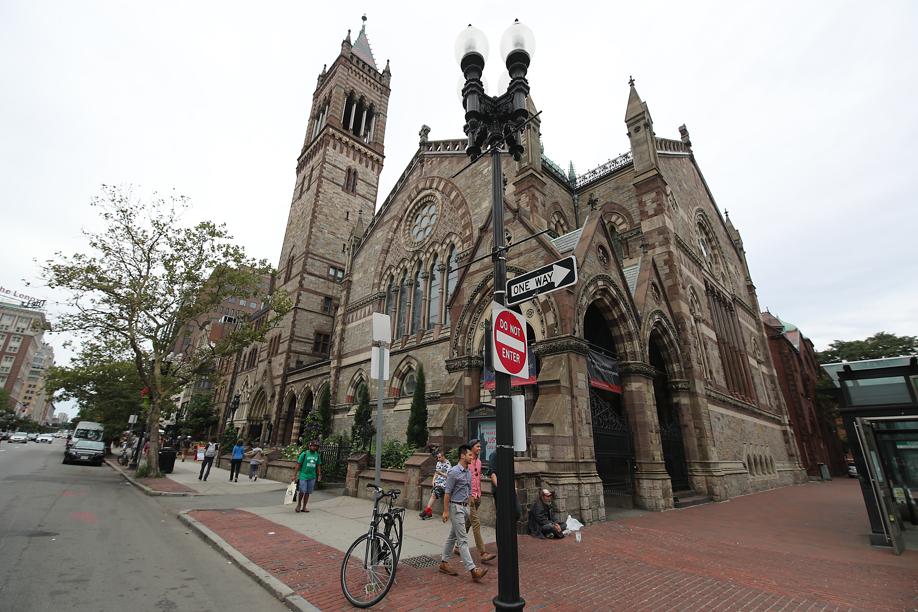DEVELOPMENT
Back Bay Station project OK’d after $6m contribution for housing, preservation
For months, Old South Church and Boston Properties had squared off over the prospect of shadows that would be created by a tower the developer wants build atop Back Bay Station. But on Thursday night, there was harmony all around, and a key city board approved the billion-dollar project. Boston Properties won the blessing of the Boston Planning & Development Agency, thanks in part to an agreement to contribute $3 million to a preservation fund for historic buildings — including Old South and Trinity Church, which worried new shadows from the tower could damage their buildings — along with another $3 million for affordable housing. Old South, in particular, had fiercely opposed the project until the deal was cut this week, but it brought a roomful of supporters from the Greater Boston Interfaith Organization to Thursday’s planning agency meeting to show their appreciation. The church and the interfaith group said they plan to keep pushing for more homeownership funding from big developments. The Back Bay Station agreement, they said, was a good first step. Along with the housing and preservation funding, Boston Properties has agreed to significant upgrades to the rail station, and plans to build three towers of housing and office spaces with new concourses that supporters say will better knit the Back Bay and South End. — TIM LOGAN
INDUSTRY
GE downsizing under new CEO
NEW YORK — Boston’s biggest company is going to get considerably smaller under a turnaround plan that new General Electric Co. chief executive John Flannery spelled out Monday. Flannery billed his changes as a reinvention aimed at putting GE back on a growth track, but he stopped short of making more dramatic changes that some on Wall Street had demanded. Most of the storied conglomerate, whose roots extend to Thomas Edison, will remain intact, and the effect on Boston will be minimal. A small Boston-based enterprise that focuses on energy efficiency will probably be eliminated, however. At his first big presentation to investors since taking the helm in August, Flannery said GE will focus on three key industries: aviation, including jet engines; energy equipment and services; and health care products such as MRI machines. It will divest a number of businesses, shrink its board of directors, and cut its dividend in half, just the second reduction since the Great Depression. “This is the opportunity of a lifetime to reinvent an iconic company,’’ Flannery said. GE’s stock fell 7.2 percent to $19.02, the biggest drop in eight years, as investors were disappointed that Flannery didn’t move more aggressively and that the restructuring would take more time to pay off than they expected. The chief executive called 2018 “a reset year.’’ Flannery, a 30-year GE veteran who had been running its health care business, became chief executive following Jeff Immelt’s sooner-than-expected departure. Immelt had reshaped GE over 16 years as its chief, selling off NBCUniversal, most of GE Capital, and the appliance division. He invested heavily in a software business known as GE Digital, made some big acquisitions, and moved the company’s headquarters from Connecticut to Boston to take advantage of what he liked to call the city’s innovation ecosystem. But investors grew restless and complained Immelt hadn’t done enough to cut costs or capitalize on big investments. — JON CHESTO
HEALTH CARE
Steward may move top jobs out of state
Steward Health Care System grew rapidly in the past year from a local hospital company to a national one, essentially quadrupling in size. Now, the Boston-based company is planning changes to its corporate offices to keep up with its national ambitions. The talk making the rounds in the local health care industry is that Steward chief executive Dr. Ralph de la Torre will move some top management jobs elsewhere. A spokesman for Steward declined to comment. But people familiar with Steward’s deliberations told The Boston Globe that Dallas is the likely location for a new corporate office. Steward’s $2 billion acquisition this fall of Tennessee-based IASIS Healthcare roughly doubled its size, after the company purchased eight hospitals from another chain, Community Health Systems, earlier in the year. As a result, Steward now has three times as many hospitals outside of Massachusetts than inside the state. Steward’s headquarters in the tower at 111 Huntington Ave. in the Back Bay is a relatively small one considering the size of the overall company — one that expects to generate nearly $8 billion in revenue next year. — JON CHESTO and PRIYANKA DAYAL MCCLUSKEY
MEDICAL MARIJUANA
Dispensary approved for Newbury Street
Boston zoning officials on Tuesday approved a proposal for a medical marijuana dispensary on Newbury Street in the Back Bay, overriding neighbors who said the facility was too close to residences and would cause traffic problems. The unanimous vote by the city’s seven-member Zoning Board of Appeal removes a major hurdle for the dispensary group, Compassionate Organics, which had abandoned an earlier bid to open a facility in Allston amid opposition from that neighborhood’s city councilor. The approval hinges on several conditions: Compassionate Organics can only sell marijuana products to registered medical patients, and cannot enter the recreational pot market without the board’s approval. It must also provide 10 free parking spaces for customers at nearby garages and pay for police details on the Commonwealth Avenue Mall to prevent public consumption of marijuana, which is illegal. The zoning board said it would officially sign off on its vote once Compassionate Organics provides copies of its contracts with parking garages and a detailed security plan. Chief executive Geoffrey Reilinger has pledged that the retail facility at 331 Newbury St., which still needs final approval from state health regulators, will remain medical-only. His group estimated it would attract an average of about 350 patients a day. The dispensary would be supplied by a 30,000-square-foot marijuana cultivation and processing facility Compassionate Organics has proposed building in Fitchburg. —DAN ADAMS
HEALTH CARE
Steward closes labor and delivery unit in Taunton
Steward Health Care System has abruptly shuttered the labor and delivery unit at its community hospital in Taunton after failing to find enough doctors to take care of newborns — a move that will disrupt hundreds of patients. Steward has a contract with Massachusetts General Hospital that allows Mass. General physicians to care for newborns at Morton Hospital in Taunton and other Steward hospitals. But Steward officials said Tuesday that Mass. General and its parent company, Partners HealthCare, are no longer sending enough physicians to tend to Morton’s tiniest patients. Steward officials maintained that it’s unsafe for them to keep delivering babies at Morton without enough newborn specialists in the building, and they told the state Department of Public Health this week that they are officially closing the hospital’s labor and delivery services. “It has become evident that Partners could not staff our unit,’’ said Dr. Joseph M. Weinstein, chief medical officer at Steward, a Boston-based for-profit company that operates nine Massachusetts hospitals. “We have worked tirelessly to try to staff it. . . . Partners left us with no options other than to close the unit,’’ Weinstein said. But officials at the Department of Public Health said Tuesday that Steward closed the unit too soon, before completing the proper regulatory process, and will be subject to fines if services don’t resume by Nov. 27. — PRIYANKA DAYAL MCCLUSKEY






